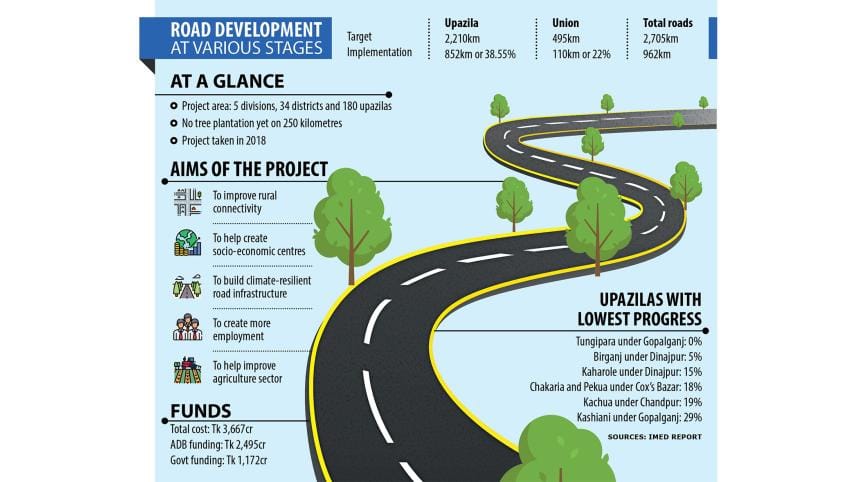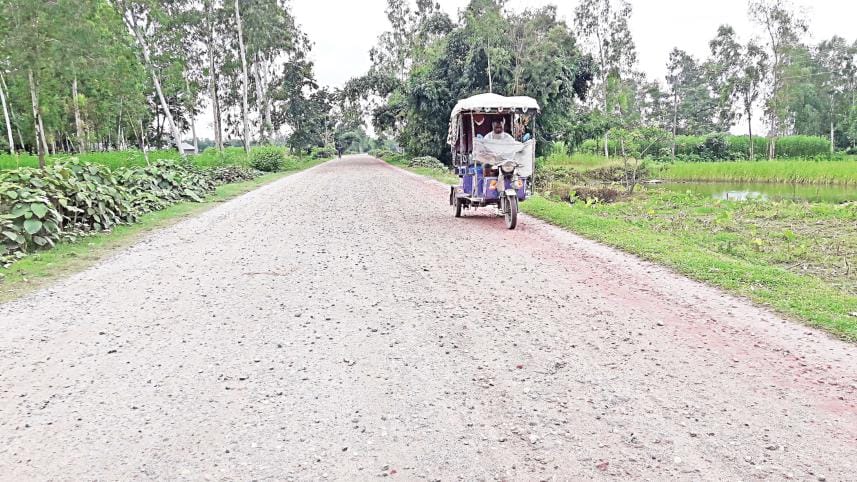Rural road project set to miss deadline

Though four of its five stipulated years have already elapsed, a Local Government Engineering Department (LGED) project on developing 2,210 kilometres of rural roads has witnessed the completion of only a third of its core task.
In other words, only 852km of roads have been developed while just one year remains for the project to be implemented, according to a report of the Implementation Monitoring and Evaluation Division (IMED).
Taken up in 2018, the "Rural Connectivity Improvement Project" sought to improve road networks in order to create jobs and connect the rural population with economic centres in 34 districts under five divisions.
The project has been estimated to cost Tk 3,667.42 crore, a majority to be funded by the Asian Development Bank (ADB). Of the sum, 41.17 per cent was spent as of March this year, an IMED analysis of the data from 51 upazilas in 17 districts showed.
If the project's other tasks are taken into account, such as vehicle purchases, foreign trips for gaining experience and training programmes at home, the project saw a physical progress of 53.63 per cent.
Key informant interviews, which are usually in-depth interviews with the people who know what is going on in a project, put the physical progress at 66 per cent and the financial progress at 48.54 per cent, according to the IMED report, which was published in June.
Though trees were supposed to be planted along 250km of roads, none was planted as of March.
The report said the project may not be completed within the stipulated time but the ADB had consented to give out another loan of $150 million and the project completion could be extended to 2026.
The report blamed the coronavirus pandemic and an abnormal rise in the price of construction materials for the implementation slowdown.
Experts of the IMED and economists have expressed concerns that delays may increase costs.
"This is an example of over-ambitious and inefficient project planning and implementation that are fast becoming a part of project culture in the country," Dr Iftekharuzzaman, executive director of the Transparency International Bangladesh, told The Daily Star.
"This not only results in wastage of public resources but also often creates opportunities for vested quarters to benefit from the time and cost overruns."
He said the LGED website, updated as of 22 June, says the project is running well. But the IMED findings, in terms of both content and quality of implementation, clearly indicate severe backlog, gross inefficiency, and a lack of internal control and oversight, he said.
Based on the IMED progress report, the remaining construction works are unlikely to be completed in the year remaining, said M Masrur Reaz, chairman of the Policy Exchange of Bangladesh, a think tank.

"The work may have been delayed for one year due to the coronavirus pandemic, but it appears that a bigger reason behind the lagging schedule of the overall construction works is the weak institutional capacity for project implementation."
As the ongoing progress was very poor, the authorities should highly focus on the construction works to complete it. Otherwise, it will burn the government's money and incur time overruns, said Md Abdul Majid, a director-general of the IMED.
Last week, Project Director Md Kamrul Islam declined to make comments, citing illness.
In early July, Md Hamidul Haque, acting project director, claimed that the LGED had completed around two-thirds of the physical work.
He, however, admitted that the coronavirus pandemic, at its peak in Bangladesh, caused the project to move slowly.
"We had several challenges during the pandemic, including tender complexities," he said.




 For all latest news, follow The Daily Star's Google News channel.
For all latest news, follow The Daily Star's Google News channel.
Comments